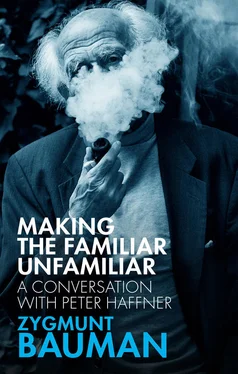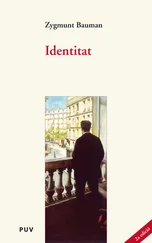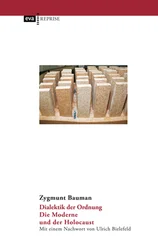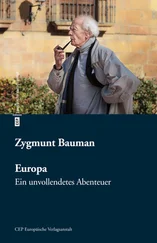1 Title Page Making the Familiar Unfamiliar A Conversation with Peter Haffner Zygmunt Bauman Translated by Daniel Steuer polity
2 Copyright Page
3 Editorial Note
4 Preface Note
5 Love and Gender Choosing a partner: why we are losing the capacity to love
6 Experience and Remembrance Fate: how we make the history that makes us Notes
7 Jewishness and Ambivalence Adaptation: why were Jews attracted to communism? Note
8 Intellect and Commitment Sociology: why it should not separate objective from personal experience Notes
9 Power and Identity Modernity: on the compulsion to be no one, or become someone else Notes
10 Society and Responsibility Solidarity: why everyone becomes everyone else’s enemy Notes
11 Religion and Fundamentalism The end of the world: why it is important to believe in (a non-existent) God Notes
12 Utopia and History Time travel: where is ‘the beyond’ today?
13 Present and Future Human waste: who are the witches of modern society? Notes
14 Happiness and Morality The good life: what does it mean to take off shoes that are too tight? Notes
15 Select bibliography Zygmunt Bauman Janina Bauman
16 End User License Agreement
1 Cover
2 Table of Contents
3 Begin Reading
1 iii
2 iv
3 vii
4 viii
5 ix
6 x
7 xi
8 xii
9 132
10 1
11 2
12 3
13 4
14 5
15 6
16 7
17 8
18 9
19 10
20 11
21 12
22 13
23 14
24 15
25 16
26 17
27 18
28 19
29 20
30 21
31 22
32 23
33 24
34 25
35 26
36 27
37 28
38 29
39 30
40 31
41 32
42 33
43 34
44 35
45 36
46 37
47 38
48 39
49 40
50 41
51 42
52 43
53 44
54 45
55 46
56 47
57 48
58 49
59 50
60 51
61 133
62 52
63 53
64 54
65 55
66 56
67 57
68 58
69 59
70 60
71 61
72 62
73 63
74 64
75 65
76 66
77 67
78 68
79 69
80 70
81 71
82 72
83 73
84 74
85 75
86 76
87 77
88 78
89 79
90 80
91 81
92 82
93 83
94 84
95 85
96 86
97 87
98 88
99 89
100 90
101 91
102 92
103 93
104 94
105 95
106 96
107 97
108 98
109 134
110 99
111 100
112 101
113 102
114 103
115 104
116 105
117 106
118 107
119 108
120 109
121 110
122 111
123 112
124 113
125 114
126 115
127 116
128 117
129 118
130 119
131 120
132 121
133 122
134 123
135 124
136 125
137 126
138 127
139 128
140 129
141 130
142 131
143 135
144 136
145 137
Making the Familiar Unfamiliar
A Conversation with Peter Haffner
Zygmunt Bauman
Translated by Daniel Steuer
polity
Copyright © 2017 by Peter Haffner
Translated from the German language: ZYGMUNT BAUMAN, Das Vertraute unvertraut machen. Ein Gespräch mit Peter Haffner. First published in Germany by: Hoffmann & Campe
This English edition © 2020 by Polity Press
The translation of this work was supported by a grant from the Goethe-Institut.

Polity Press
65 Bridge Street
Cambridge CB2 1UR, UK
Polity Press
101 Station Landing
Suite 300
Medford, MA 02155, USA
All rights reserved. Except for the quotation of short passages for the purpose of criticism and review, no part of this publication may be reproduced, stored in a retrieval system or transmitted, in any form or by any means, electronic, mechanical, photocopying, recording or otherwise, without the prior permission of the publisher.
ISBN-13: 978-1-5095-4230-7
ISBN-13: 978-1-5095-4231-4 (paperback)
A catalogue record for this book is available from the British Library.
Library of Congress Cataloging-in-Publication Data
Names: Bauman, Zygmunt, 1925-2017, interviewee. | Haffner, Peter, 1953-interviewer.
Title: Making the familiar unfamiliar : a conversation with Peter Haffner / Zygmunt Bauman ; translated by Daniel Steuer.
Other titles: Vertraute unvertraut machen. English.
Description: Cambridge, UK ; Medford, MA : Polity Press, 2020. | Includes bibliographical references. | Summary: “The last interview of one of the greatest social thinkers of our time”-- Provided by publisher.
Identifiers: LCCN 2020012868 (print) | LCCN 2020012869 (ebook) | ISBN 9781509542307 (hardback) | ISBN 9781509542314 (paperback) | ISBN 9781509542321 (epub)
Subjects: LCSH: Bauman, Zygmunt, 1925-2017--Interviews. | Sociologists--Poland-- Interviews. | Civilization, Modern--20th century. | Sociology--Philosophy.
Classification: LCC HM479.B39 A5 2020 (print) | LCC HM479.B39 (ebook) | DDC 301.092--dc23
LC record available at https://lccn.loc.gov/2020012868
LC ebook record available at https://lccn.loc.gov/2020012869
by Fakenham Prepress Solutions, Fakenham, N orfolk NR21 8NL
The publisher has used its best endeavours to ensure that the URLs for external websites referred to in this book are correct and active at the time of going to press. However, the publisher has no responsibility for the websites and can make no guarantee that a site will remain live or that the content is or will remain appropriate.
Every effort has been made to trace all copyright holders, but if any have been overlooked the publisher will be pleased to include any necessary credits in any subsequent reprint or edition.
For further information on Polity, visit our website: politybooks.com
The conversations with Zygmunt Bauman that form the basis of this book took place on 10 February 2014 and 21–23 April 2016 at his home in Leeds, England. In addition, Bauman provided me with notes containing biographical information and thoughts on various topics, as well as with excerpts from his then forthcoming book Retrotopia , and he asked me to make use of certain passages of these written sources as answers to some of my questions, so that he would not need to repeat himself in conversation. He also asked me to make use, at one point, of his answers to two questions that had been put to him in an interview conducted by Efrain Kristal and Arne De Boever and published under the title ‘Disconnecting Acts’ in the Los Angeles Review of Books of 11/12 November 2014. In total, the passages based on all these written sources amount to about a dozen pages of the text.
My 2014 interview appeared on 4 July 2015 under the title ‘Die Welt, in der wir leben’ [The world we live in] in Das Magazin (the Saturday supplement of Tages-Anzeiger , Basler Zeitung , Berner Zeitung and Der Bund ).
Peter Haffner
When I visited Zygmunt Bauman for the first time, I was astonished by what seemed a contradiction between the person and his work. Arguably the most influential European sociologist, someone whose anger about the state of the world can be felt in his every line, Bauman enchanted me with his wry sense of humour. His charm was disarming, his joie de vivre infectious.
Читать дальше













